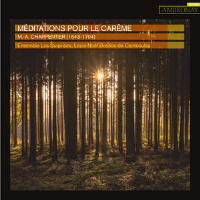Texte paru dans: / Appeared in:
|
|
|
Outil de traduction ~ (Très approximatif) |
|
|
Reviewer: William
J. Gatens
In his booklet notes this conductor says that “the program of this recording has been built around the personality of Sebastian de Brossard (1655-1730).” He was a priest, composer, lexicographer, and music theorist. In 1687 he was appointed vicar at Strasbourg Cathedral, and soon afterward maitre de chapelle. In addition to his cathedral duties, he founded a musical academy in the city and directed secular concerts, opera, and ballet. He was also an indefatigable collector of
music, including original
manuscripts, manuscript copies, and printed editions amounting to nearly
1,000 items. As he had no heirs, he bequeathed his collection to King Louis
XV, and it now forms an important part of the music department of the
Bibliothèque Nationale. Brossard’s collection is often the only source for
the pieces it contains. That is the case for the 10 Meditations for Lent (H
380-389) by Marc-Antoine Charpentier on this recording. Charpentier left
some 28 manuscript volumes of his works, but these brief motets are not
among them. The musical forces are modest: three male voices (alto, tenor,
and bass) and continuo. The motets are primarily a series of meditations on
the Passion of Christ, and Bestion likens them to the Stations of the Cross.
The first two are songs of desolation with no direct reference to the
Passion. Two other motets take their texts from Holy Week Tenebrae
Responsories. Others have texts adapted from scripture, including dialogs
that Charpentier sets dramatically. The concluding motet is on the theme of
the sacrifice of Isaac, understood as prefiguring the Passion of Christ. It
seems significant that the motet text does not include Isaac’s rescue, and
so strengthens the association with the Passion. Charpentier spent a
substantial part of his career providing music for the Jesuit church in
Paris. He had been a student of Giacomo Carissimi, and his Italian
predilections are well known. Brossard was also an admirer of Italian music.
It is entirely possible that the Meditations for Lent were intended for an
extra-liturgical devotion at the Jesuit church, and the dialogs show an
affinity with Italian oratorios of that period.
Two motets by Brossard are
included here. The text of ‘Salve Rex Christe’ is adapted from the Marian
antiphon Salve Regina. ‘O Plenus Irarum Dies’ sets a text by Jean de Santeul,
a canon of the Abbey of St Victor in Paris. The subject is the Last
Judgement, and the poem is similar to the Dies Irae sequence. As a composer,
Brossard is a consummate professional, but as I have observed in other
reviews, he does not have quite the spark of imagination that we find in
Charpentier or Couperin. The program is filled out with two somber
instrumental pieces: a Tombeau for theorbo by Robert de Visée (c1655-c1723)
and a Prelude in D from the first book of Pieces for Viola da Gamba by Marin
Marais (1656-1728).
Their performances here
display great technical aplomb and keen expressiveness. Some years ago I
reviewed a recording of the Meditations for Lent by Ensemble Pierre Robert
under Frederic Desenclos (Alpha 91; M/A 2007). The performances on both
recordings are very fine. The earlier one has a greater sense of space, and
I find that attractive, though the balance between voices and instruments is
not always ideal. The present recording sounds closer and more intense. | |
|
|
|
|
Cliquez l'un ou l'autre
bouton pour découvrir bien d'autres critiques de CD |
|




